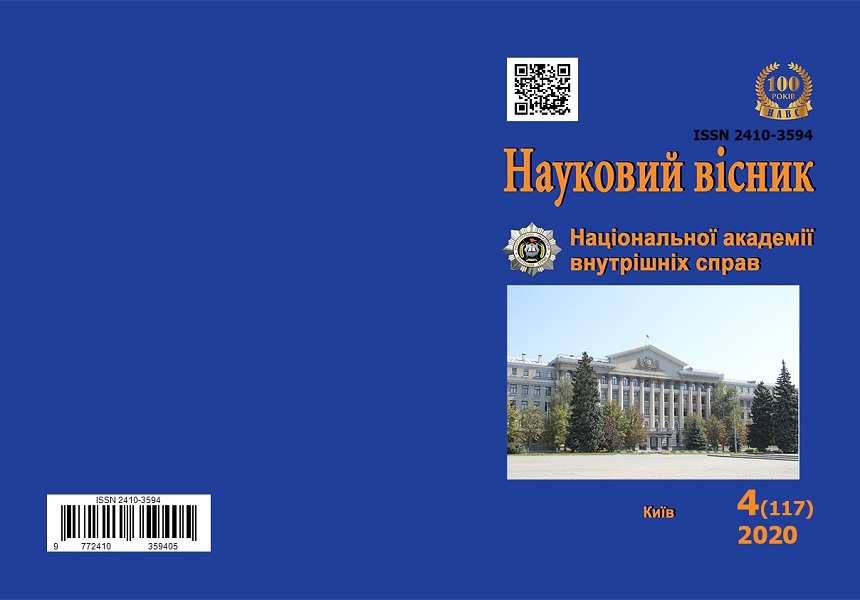Features of Establishing the Influence of Criminogenic Factors on a Person’s Behavior in the Process of Pre-Trial Probation
Abstract
The purpose of the article is to analyze the features of establishing the influence of criminogenic factors on the behavior of a person during the implementation of pre-trial probation and the study of the legal framework and methods of compiling a pre-trial report. To achieve this goal, the article performs the following tasks: established the impact of criminogenic factors on the behavior of the accused, and some processes of pre-trial probation defined by criminal law, provided suggestions and recommendations to improve the use of pre-trial probation reports in Ukraine. Methodology. The study used a dialectical method of scientific knowledge of socio-legal phenomena in their contradictions, developments and changes, which allows to objectively assess the level, providing the court with information characterizing the identity of the accused in the pre-trial report, the effectiveness of national legislation in preventing criminal offenses, as well as problematic issues during the collection of information in the implementation of pre-trial probation. Formal-logical method, by means of which elements of the legal mechanism of prevention of criminal offense by probation bodies are revealed. The comparative legal method was used in the analysis of current legislation and international regulations; statistical – in the analysis of empirical data and in the process of studying statistical material; formal logic (analysis and synthesis, hypothesis) – in determining the main directions of scientific work and the main problems. The theoretical basis of this publication were the works of domestic and foreign scientists on the establishment of crime factors and improving the effectiveness of crime prevention in Ukraine in modern conditions. The scientific novelty of the publication lies in the need for a thorough analysis of criminogenic factors that have been identified during the implementation of pre-trial probation. Conclusions. Based on the results of the study, the problematic issues of implementation of pre-trial probation measures were considered; arising from the establishment of criminogenic factors, the procedure for taking measures against the person of the accused; appropriate proposals and recommendations for improving the correctness of the formulation and application of pre-trial reports were provided.
Keywords: pre-trial probation; pre-trial report; accused; probation body; criminogenic factors.
Downloads
References
Бережнюк В. М. Досудова доповідь служби пробації, як передумова для індивідуалізації покарання під час його призначення. Науковий вісник Міжнародного гуманітарного університету. 2019. № 41 (2). С. 65–67. (Серія «Юриспруденція»). doi: https://doi.org/10.32841/2307-1745.2019.41-2.14.
Чернишов Д. Місця позбавлення волі не забезпечують попередження рецедивної злочинності. Міністерство юстиції України : [сайт]. 2018. URL: https://minjust.gov.ua/news/ministry/denis-chernishov-mistsya-pozbavlennya-voli-ne-zabezpechuyut-poperedjennya-retsidivnoi-zlochinnosti/.
Чугаєвська А. В. Окремі аспекти впровадження досудової доповіді при звільненні особи від відбування покарання. Правове регулювання економіки. 2019. № 18. С. 189–199. doi: 10.33111/lre.2019.18.189.
Досудова пробація: практичні поради. 2017. URL: https://www.facebook.com/probation.ua/posts/1790454724551902.
Джужа О. М., Василевич В. В., Колб О. Г. Кримінологія : навч. посіб. / за заг. ред. О. М. Джужі. Київ : Атіка,
312 с.
Науково-практичний коментар до Закону України «Про пробацію» / за заг. ред. О. Л. Копиленка, Є. Ю. Бараша. Київ : Кандиба Т. П., 2019. 114 с. URL: https://www.researchgate.net/profile/Yevgen_Barash2/publication/ 332230121_NAUKOVO-PRAKTICNIJ_KOMENTAR_DO_ZAKONU_UKRAINI_PRO_PROBACIU/ links/5ca75f63a6fdcca26dffe0c6/NAUKOVO-PRAKTICNIJ-KOMENTAR-DO-ZAKONU-UKRAINI-PRO-PROBACIU.pdf.
Макаренко Н. К. Нейтралізація криміногенності місць позбавлення волі, як напрям запобігання професійної злочинності. Вісник Пенітенціарної асоціації України. 2020. №. 1 (11). С. 90–99. doi: 10.34015/2523-4552.2020.1.09.
Методичні рекомендації оцінки ризиків вчинення повторного кримінального правопорушення повнолітніми особами, які вчинили кримінальні правопорушення (обвинувачуються у вчиненні кримінальних правопорушень) : наказ Міністерства юстиції України від 26 черв. 2018 р. № 2020/5. URL: http://www.probation.gov.ua/?p=2308.
Пальченкова В. М. Служба пробації як особливий вид соціального контролю. Науковий вісник Дніпропетровського державного університету внутрішніх справ. 2015. № 3. С. 171–177.
Пузирьов М. С., Карелін В. В., Олефір Л. І. Теоретико-прикладні підходи до визначення оцінки ризиків вчинення нових кримінальних правопорушень суб’єктами пробації. Науковий вісник Сіверщини. 2019. № 2 (7). С. 73–82. (Серія «Право»). doi: 10.32755/sjlaw.2019.02.073.
Скребцова О. І. Досудова доповідь в пробації. Новопсковська селищна рада : [сайт]. 2020. URL: https://novopskovrada.gov.ua/news/1588165183.
Яковець І. С., Карелін В. В. Щодо оцінки ризиків вчинення нових кримінальних правопорушень особами, які відбувають покарання, не пов’язане з позбавленням волі. Правова позиція. 2019. № 4 (25). C. 116–122. doi: https://doi.org/10.32836/2521-6473.2020-1.23.
Янчук О. Навіщо потрібна досудова доповідь у судовому процесі? Судова влада України : [сайт]. 2019. URL: https://bl.od.court.gov.ua/sud1506/pres-centr/news/738747/.
Про пробацію : Закон України від 27 серп. 2015 р. № 160-VIII. URL: https://zakon.rada.gov.ua/laws/show/160-19.
Abstract views: 136 PDF Downloads: 721
- Authors reserve the right to authorship of their own work and transfer to the magazine the right of the first publication of this work under the terms of the Creative Commons Attribution License, which allows other persons to freely distribute published work with mandatory reference to authors of the original work and the first publication of an article in this magazine.
- Authors have the right to enter into separate additional agreements on non-exclusive dissemination of the work in the form in which it was published in the journal (for example, to post an article in the institution's repository or to publish as part of a monograph), provided that the link to the first publication of the work in this journal is maintained.
- The journal's policy allows and encourages the posting of articles by authors on the Internet (for example, in electronic storehouses of institutions or on personal websites), both before the submission of this manuscript to the editorial office and during its editorial processing, as this contributes to the creation of a productive scientific discussion and positively affects the efficiency and dynamics of citing the published work.




